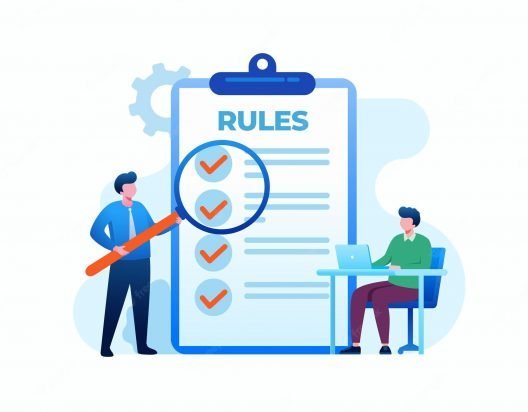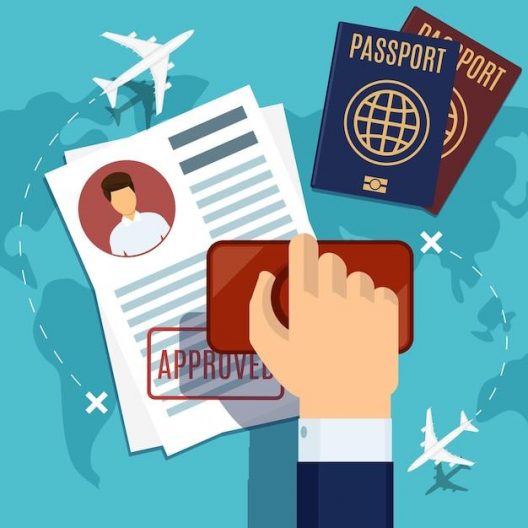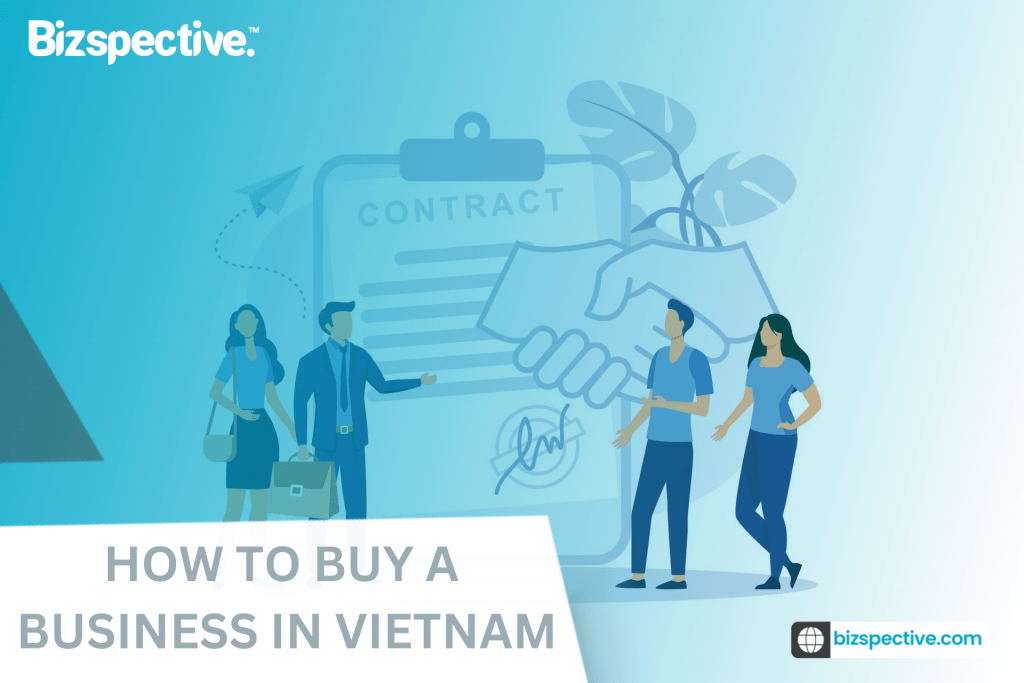A foreign investor / entrepreneur can either fully buy out a business, or they could partially invest to acquire equity in an existing business in Vietnam. This guide focuses on the first option: how to buy a business in Vietnam. In another guide, we will cover the second option: buying equity. Buying a business in Vietnam is considered much faster and easier compared to starting a new business. And it is also a way to eliminate initial setup costs and to take advantage of existing resources. Furthermore, becoming a business owner in Vietnam entitles the foreigner to a long term visa.
Table of Contents
1, What are the advantages of buying a business in Vietnam?
- Potentially acquiring a great location and lease agreement.
- The difficult start-up work has already been done. The business should have plans and procedures in place.
- Buying an established business often means immediate cash flow.
- The business will have a financial history, which gives you an idea of what to expect rather than a completely new start-up which will have higher risks.
- You will acquire existing customers, contacts, goodwill, suppliers, staff, plant, equipment and stock.
- Existing employees and managers will have experience they can share.

2, Legal structure.
What are the most common types of business structures and how do they affect the purchase procedures of the business:
Family owned business.
This business structure is a common structure in Vietnam for some of the small businesses you see. A family business means that they are fully liable with their personal capital, compared to an LLC which limits the liability to the investment capital put into the business. The benefits of this structure are that the taxes are much less and that it is generally much easier to run from a legal, accounting and tax standpoint. Having said that, this business can not be sold in any way. So if either a Vietnamese national or foreigner wanted to purchase this type of business then first it would need to be converted into an “investable” legal structure, which would mean following the business registration procedures.
Vietnamese owned Limited Liability Company (LLC)
If a foreigner is purchasing a Vietnamese owned LLC, then they will still need to go through the approval procedures of a foreign owned company in Vietnam. As you will need to get an approval from the local Department of Planning and Investment. Therefore you will need to thoroughly check that this business is in fact open to foreign investment. You can look at paragraph number 4 to see the potential foreign ownership restrictions below. Furthermore, the charter capital must be realistic, as the authorities can use their discretion to decide whether or not to approve the transfer of ownership.
Foreign owned Limited Liability Company (LLC)
If a foreigner currently owns any equity at all in a business, it is registered as a foreign owned company. This means it is so much easier for a new foreign investor to buy that business. This is due to the fact that the company will have all the required certificates and documentation already. However, any new investor still needs to send a proposal to the local investment authorities for approval. And again, the charter capital must be realistic.
What are ‘business lines’ and why are they important?
Business lines are the listed activities the business can participate in. For example management consulting, retail, marketing, real estate consulting, F&B, etc. The business is limited to those business lines, however additional business lines can be added to the business license for a small administrative fee. You can see these business lines in the online company registration database, and it is advisable to carefully check these before deciding to try and buy out an existing business, because not all business lines are open to foreign investment. If you have any questions regarding business lines or anything related to business law in Vietnam, you can speak to Bizspectives legal advisor, Mr Simon Le. Just click “ask a question” on his page to inquire any questions you might have.

3, Investment capital requirements.
Every company in Vietnam must register a certain amount of “charter capital”. You can understand this to be the amount of capital that the company needs in order to pay its bills, in other words: to survive. Except for some specific business lines (e.g. tourism, education or healthcare), Vietnamese Law does not normally prescribe any minimum amount of charter capital for companies. However, when you as a foreigner are investing into an existing company: you will need to make sure that the local investment Authority who is in charge of approving your application file, is satisfied with the charter capital of the target company.
From experience, we know that Authorities in different Vietnamese cities and provinces apply different policies in order to determine whether they find the charter capital sufficient or not. For example: Ho Chi Minh City and Ha Noi are known as the most business friendly cities of Vietnam, and the practical minimum charter capital for a foreign – owned company is currently (09/22) around USD 10 – 15,000. Da Nang and Hoi An (Quang Nam) on the other hand are much stricter, currently (09/22) the minimum acceptable amount in practice is around USD 35 – 45,000. These numbers tend to change from time to time, but over the past few years we have seen an upward trend.
From a positive perspective, the Authorities tend to be a little less strict when they are approving a change of ownership of an existing company, compared to when you are establishing a completely new company from scratch. And in fact, it is often decided case by case. But still it is good to realize that the amount of charter capital of your target company is something that the Vietnamese Authorities may look at when deciding on the change of ownership. Furthermore, please keep in mind that your investment visa options are directly linked to the amount of charter capital that you invest. For more information, we invite you to have a look at our article ‘full guide to visas in Vietnam’ and also our youtube video on ‘how to obtain a long term visa in Vietnam.’

Businesses For Sale Listings
In Vietnam
4, What are the main foreign business ownership restrictions in Vietnam?
If you, being a foreigner, are planning to buy an existing business in Vietnam, then there are a few foreign ownership restrictions to keep in mind.
Restricted business locations in Vietnam.
Vietnam has some restricted locations for foreign owned businesses. These vary from province to province. For example, Da Nang has a restricted sea boundary area, where it is very difficult (often even impossible) for a foreign to register or own a company. And in Hoi An, the local investment Authorities are making it more and more difficult for foreigners to own registered businesses within the UNESCO World Heritage site of the Old Town. The official reason is often that Vietnam’s National security is at stake, which means that in order to get the required approval several other Departments of the Government would need to look at it. Having said all of this, the local Authorities often have a large amount of discretionary power to give their approval. So it is always a good idea to check with our team or with your lawyer first before proceeding.
Restricted business lines.
Some business lines are restricted for foreign investment. Some of these business lines are completely off – limits, for example everything related to Vietnam’s National security. Other business lines are open to foreign investment, but only in cooperation with a Vietnamese co – owner, for example: advertising. There are business lines that require a certain minimum amount of investment capital, for example: healthcare. And there are business lines that have certain diploma / staff requirements, for example: tourism, and education. If you are doubting whether a specific business line has any restrictions: then drop us a message, and we will get back to you. For example: if you have seen a fully – Vietnamese owned company that you would like to (partially) buy: then our team can check for you which business lines are registered, and whether or not (partial) foreign ownership is legally allowed. But it could also be useful to check existing foreign owned companies, so you know what activities those companies are legally allowed to conduct.

5, What visas can an investor obtain?
Investors Visa.
If your capital contribution is less than VND 3 billion, you are entitled to up to a 1 year multiple entry visa. This visa can easily be renewed each year.
TRC
If your capital contribution is over VND 3 billion, you are entitled to a TRC with a validity period of 3 years.
Work permit & Visa.
If you qualify for all the necessary requirements, then you might want to apply for a work permit and work visa in the company. However the requirements are more difficult compared to an investor’s visa. Furthermore there are some additional costs to keep in mind, including: social insurance, health insurance, and personal income tax. Only foreign investors who invest more than VND 3 billion are exempt from the work permit requirement, other investors still need to obtain it, even if it is under their own company.
Things to consider when thinking about applying for a work permit, include: how would this impact your tax situation, are you interested in the social insurance benefits for employees, and how often / where in the World would you like to be paid. To give you an idea, dividend tax is just 5% in Vietnam (investors visa and TRC), whereas personal income tax has different tax brackets depending on the salary.
For more information on visas, you can take a look at this youtube video or contact our team and we can connect you with our visa expert partners.

6, What are the procedures of buying a business in Vietnam?
If you want to buy an existing company in Vietnam, then you will need to complete certain administrative / legal procedures. Our Bizspective team, or your Vietnamese lawyer can support you with those procedures. But let us give you some indications about what those procedures may look like, how long they would take, and how much they would cost.
Time frame.
Which procedures need to be followed exactly when buying a business in Vietnam? Well that depends on factors such as: current ownership status, desired ownership status, the location of incorporation, and the registered business lines.
Example 1: if your target company is currently fully Vietnamese – owned and you want to buy 100% of it: then the enterprise registration certificate would need to be updated, and you would need to get approval from the licensing Authorities. Estimated time frame: 3 – 5 weeks.
Example 2: if your target company is already (partially) foreign owned, and you want to buy all of it: then the enterprise registration certificate and the investment registration certificate would need to be updated, and you would need to get a relatively difficult approval from the licensing Authorities. Estimated time frame: 4 – 6 weeks.
A complicating factor may be that one or more of the registered business lines is not open to foreign ownership, in which case those business lines would first need to be adjusted before the ownership can be changed.
Fees.
Administrative fees in Vietnam are relatively cheap, at least much cheaper than in many Western countries. However, often they are also complicated, time – consuming, little transparent, and they could in fact be quite frustrating. So even though in theory you could try to do it by yourself, in practice most foreigners choose to let a Vietnamese service provider take care of the administrative / legal side of the (partial) purchase of an existing company in Vietnam.
Our Bizspective team has good quality, English – speaking, professional service providers in all of Vietnam’s major cities, and we would be happy to connect you directly with one of them. Service fees depend on the complexity of the procedures, which (see the foregoing section) depends on factors such as ownership status, location of incorporation, and registered business lines. To give you a ballpark figure: example 1 may cost somewhere between 300 – 450, and example 2 somewhere between 450 – 600.

7, Things to consider regarding the operations of the business.
Successful handover from the business owner
It would be best if you can negotiate a handover period with the current owner, so that they must spend some time and training with both you and any relevant new members of the company. Even better is if the owner can prepare SOPs for recurring and important tasks so that you don’t miss or forget any of the procedures and so that you can delegate these SOPs to relevant personnel. Keep in mind that the turnover of employees in Vietnam is generally quite high. Here are some things to keep in mind in the handover process.
- Systems.
- Invoicing & POS.
- Processes.
- Contacts of partners and suppliers etc.
- Customer database. (CRM)
- Social media channels, email addresses, google business location, telephone numbers, etc.
Turnover of employees.
There is nothing worse than taking over a business and then suddenly the employees start to leave. It’s advised to have some meetings with the employees to see how they are doing and to figure out if they are happy to stay long term.
Necessary due diligence before buying a business in Vietnam.
Licenses & Certificates.
Make sure you have checked all the relevant documents before buying a business in Vietnam. Here is a non-exhaustive list of required documents.
IRC – Investment registration certificate.
(required for foreign owned businesses)
ERC – Enterprise registration certificate.
(required for all businesses)
Sub-licences.
Depending on the business lines of the business, the company may need additional sub-licences, for example for a restaurant a food safety and hygiene certificate will be required, or for a bar then an alcohol license may be required.
You should make sure to double check the name of the owner on the IRC & ERC and the registered investment capital amount.
Lease agreement.
You must check the lease agreement very carefully as it is a common pitfall for many acquisitions. Some things you will need to carefully check:
1, First you need to check the pink book. This is the ownership certificate of the land and the buildings on the land.
2, Does the name of the individual who signed the contract match the name of the landlord on the pink book.
3, Lease duration.
4, Do you have priority when the lease ends over other potential lessees?
5, What is the liquidation clause in the contract? How much notice does the landlord need to provide you if he wants to liquidate (cancel) the contract. And is there a penalty if he does so?
An issue we have seen several times is when the landlord essentially kicks the business owner out of the property. It can be so that that landlord then opens their own business in that location. Sometimes it can be a copy of your business if it’s doing well, but this is very rare, it is more likely that they decide to sell the land resulting in liquidating the contract. The only way to protect yourself from this is to make sure there is a notice time period clause in the contract, and even better if there is a penalty that the lessee must compensate for.
Finance
Checking financial reports.
It can be quite difficult to thoroughly check the financial reports before buying a business, this is due to the fact that many business are mainly taking cash therefore its not possible to cross check between the P&L and bank statement
You should ask for all financial statements, profit and loss, balance sheet and cash flow statements, however keep in mind that many micro businesses in Vietnam will probably not have a sophisticated accounting system.
For small brick & mortar / F&B businesses:
A good way to reduce risk is to make a draft financial forecast, and to collect data in more tangible ways. For instance, if the business is a restaurant, you can figure out (with the owner) the estimated profit margin per customer. And then either ask the staff or even physically count the customers between different days and times, you will then be able to calculate the estimated turnover and gross profit. Of course this gives you just a ballpark figure and not an accurate way to evaluate a businesses performance, however it can be very useful for small to medium sized F&B businesses where the financial reports cant be cross checked.
Checking tax reporting and compliance is up to date.
You can ask the accountant to update you on all the tax reports. Some of the reports you might want to double check (but not limited to) are as follows:
- Check if all registered employers SHUI is up to date: social insurance, Health insurance, unemployment insurance, Trade union fee.
- VAT
- Reporting and taxes.
- Social insurance registration.
- Annual compliance reports.
- Business license tax. (paid once per year)
Take a look at this article for more information about tax reporting and compliance.
Who is in charge of the finance and accounting of the company?
It’s important to find out who and how are the accountants running the businesses books. Generally for smaller businesses, the general day to day accounting will be done in-house and tax reports for the tax authorities will be prepared and managed by a 3rd party accounting and tax firm. This monthly fee can range from 2,000,000 VND and above depending on how much work there is, this is usually calculated in the amount of invoices per month.
POS systems.
If you are looking to purchase a brick & mortar business, it is a good idea to check the POS system, and see if there is a card reader and if it is all set up accordingly so that you can manage and track the businesses finances effectively and accurately.
Check the company bank account.
Each company in Vietnam will have 2 locations to store the capital of the company. Cash reserve and in the company bank account. You should check the company bank account to see if the account balance matches the financial reports.

8, Summary
It can be very beneficial for various reasons to buy an existing business in Vietnam, however there are some important things to look out for before committing. We hope that this article has helped clarify a few important points, and if you have any questions you can contact our team at any time.
Click this link to take a look at our latest business for sale listings in Vietnam.
